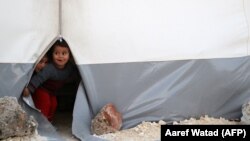On July 12, Russia prevented the United Nations Security Council from extending a U.N. mandate on cross-border humanitarian deliveries to rebel-held Idlib in northwestern Syria for one year.
The new extension was the third attempt by the U.N. security council to renew the cross-border mission’s mandate until the middle of 2023, but Russia was able to win a demand to extend it for six months only.
The aid deliveries flow from Turkey to Syria through the Bab al-Hawa border crossing, the last remaining humanitarian corridor out of four established by the U.N. in 2014.
The U.S. representative to the U.N., Linda Thomas-Greenfield, accused Russia of hijacking the U.N. process. The Russian proposal “fails to sufficiently meet needs on the ground and extends the mechanism only for six months, benefiting Syria’s regime more than the people of Syria,” Thomas-Greenfield said.
Dmitry Polyanskiy, Russia’s first deputy U.N. ambassador, denied the accusations, calling them “lies.”
"The picture, which our Western counterparts are trying to present, that Russia is allegedly against the mechanism of cross-border aid and is against the extension of this mechanism are [sic] absolutely false," Polyanskiy said.
That is misleading. Russia has been obstructing U.N. drafts, including the recent resolution presented by the Western countries, to secure long-term humanitarian deliveries to Syrians. Instead, Russia has been pushing to set up its aid delivery mechanism to bolster its ally Assad in Damascus.
Last week, U.N. member states considered two competing resolutions, both of which were voted down.
Russia vetoed the first resolution, presented by Norway and Ireland, which sought to extend the humanitarian mission for six months through the Bab al-Hawa border crossing, with the possibility of automatically extending it for additional six months.
Instead, Russia presented an alternative text which called for a six-month extension followed by a hand-over of humanitarian aid operations to its ally, the Assad government. The Russian proposal was vetoed by France, the United Kingdom and the United States.
While calling accusations of blocking aid to civilians “lies,” it is Russia that shut down three out of four border crossings the U.N. established in 2014 to provide vital aid to millions of Syrians.
In 2020, Russia threatened to use its Security Council veto power to prevent reauthorizing three border crossings into Syria - one from Jordan, the second d from Iraq and the third from Turkey – effectively forcing the U.N. Security Council to remove them.
Russia has been pushing for distributing aid to Syria through Damascus, arguing that aid deliveries from Bab al-Hawa outside Syria’s government control “violate Syria’s sovereignty.”
International law requires humanitarian aid to be distributed through the host government.
But the U.N. established the corridors in response to Assad’s violation of international humanitarian law aimed at forcing Syrian rebels into submission by blocking aid to their areas and starving the people living there.
In 2019-2020, Damascus, with a green light from Russia, manipulated humanitarian aid to Roukban Internally Displaced Persons (IDP) camp inside the Tanf camp in eastern Syria. The Tanf camp is secured by U.S. and local Syrian opposition forces.
“Despite the enormous effort by the U.N., US military, and other participants, only two humanitarian shipments made it across these lines, and various conditions placed on their movements pressured the IDPs to return to Syrian control, which in the end a large majority did,” the Wilson Center reported in July 2021.
But the World Food Program (WFP) said that while it only delivered food to fewer than 50,000 people via Damascus, it provided aid to 1.4 million people via the Bab al-Hawa hub, the BBC reported.
According to Foreign Policy magazine, Russia’s moves vis-a-vis the humanitarian corridors into Syria “[a]im to consolidate Syrian government control over a broader swath of Syrian territory, the key to Russia’s long-term aims of maintaining a pliant client state that can expand its power projection in the Eastern Mediterranean.”
The New York Times said that Russia might try to use the fate of the Bab al-Hawa border crossing as a bargaining chip with world powers in the war in Ukraine, given that shutting that aid corridor could trigger a new wave of refugees to Europe and the Middle East.
About 4 million people are trapped in the last rebel-held stronghold in Idlib controlled by jihadis and Turkey-backed rebels. Since 2014, more than 56,000 trucks have carried food, medicine, tents and other life-saving supplies through the border-crossings. Some 800 trucks enter through Bab al-Hawa a month, bringing aid for 2.4 million people in Idlib. The area is under a ceasefire agreement brokered by Russia in 2020, but it regularly sees clashes, airstrikes and shelling.
Syria is in its eleventh year of war, which has created what U.N. Secretary-General Antonio Guterres says is the world's largest refugee crisis. More than 11 million Syrians have been displaced, including 6.6 million displaced internally and 5.6 million made refugees. According to the U.N., 14.6 million Syrians need humanitarian assistance, 12 million are food insecure and 90% of the population lives under the poverty line.
Countries opposing Russia’s latest proposal warned that shutting down the Bab al-Hawa border crossing will jeopardize the humanitarian aid that millions of Syrians need to survive.






